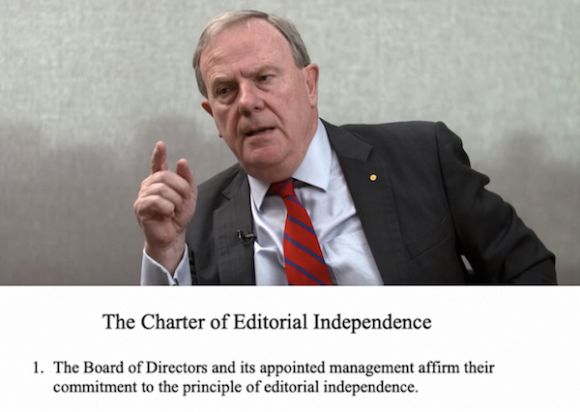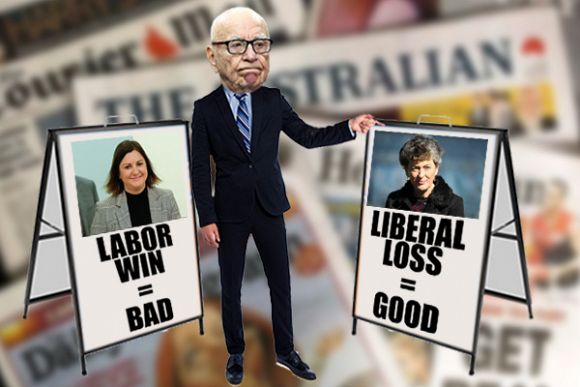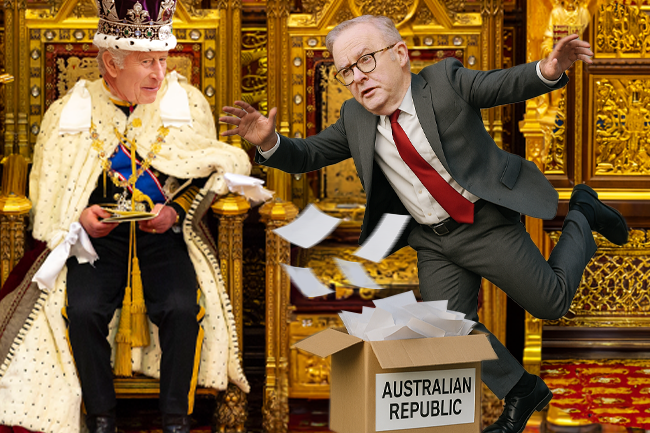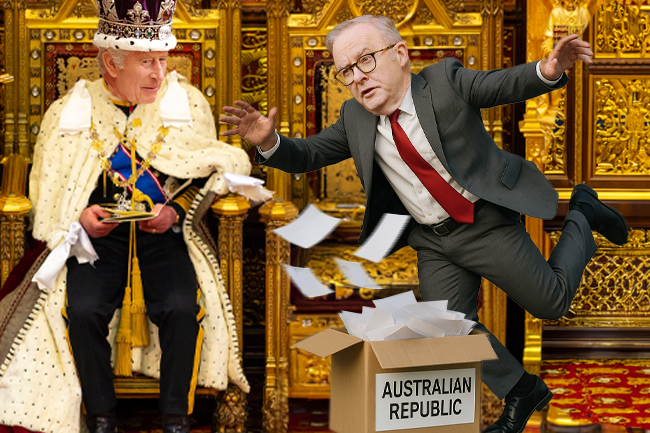48 hours in and 3,265 supporters have given nearly $280,000. Wow.
Seems like this minnow has a fighting chance!
~ 28 August 2022 update by Private Media (publisher of Crikey) on crowdfunding platform GoFundMe.
On 26 August, online publisher Crikey launched a crowdfunding campaign to support its decision to defend a defamation lawsuit from Lachlan Murdoch. Crikey's campaign raises several serious questions.
Crikey is using public antipathy towards the Murdoch media and Donald Trump to set itself as the stone thrower in a David versus Goliath battle. In itself, there is nothing wrong with that.
The first two paragraphs in its GoFundMe blurb summarise Crikey’s case:
On August 23, the billionaire chairman of Fox News, Lachlan Murdoch, sued [sic] Crikey over an article published in June that covered the role of Fox News in the Jan 6 insurrection in Washington DC. That article did not name Lachlan Murdoch (rather, one paragraph referred to “the Murdochs”); the headline mentioned the word “Murdoch”.
Based on those two references, published on a small independent news website in Australia, Lachlan Murdoch has unleashed his legal and financial forces against us.
Over and again during the past week, Crikey has cast itself as a small, independent, poorly funded website in order to generate publicity and hype ─ and it seems to be working.
Crikey’s stated goal is to raise $3 million. At time of writing (31/8/22), over $400,000 had been raised. It has also used the action as a means of drumming up new subscribers, presenting new subscriptions as the preferred support option.
The little indie website battling against the evil Murdoch machine.
Sounds like something we can all get behind, right?
Wrong. Because while Crikey may be small – at least in relation to the Murdoch monstrosity – it is neither independent nor poorly funded. In fact, it is majority owned by a multimillionaire and backed by two media barons.
Don't get us wrong, anyone sticking it to the Murdoch machine deserves praise and Crikey is a comparatively progressive publication, doing some great work. But a poor little indie website battling against the behemoth?
This editorial will attempt to set the record straight in the interests of Australians, many of whom are doing it tough at the moment ─ unlike the people behind Crikey.
THE TRUTH ABOUT CRIKEY
In its many articles about this matter over the last week, Crikey has used terms like “small independent” and “minnow” to describe its operations. Of course, its need to set up a crowdfunding initiative also clearly implies it is low on funds, though it has been careful to never quite say that, in so many words.
Also implied is that Crikey has no choice but to defend itself, which may lead it to the brink of collapse.
It’s a compelling narrative ─ and possibly an almost entirely fictional one.
The truth is, Crikey is neither poorly funded nor truly independent. And it could easily have avoided this confrontation. It had, in fact, effectively closed the matter down months before, by removing the article 20 minutes after receiving the concerns notice. But last week, Crikey decided to rekindle the matter by republishing the offending article. Why it decided to manufacture a fight with the Murdochs is not clear ─ but we can make some well-educated guesses.
A POORLY FUNDED “MINNOW” AND “SMALL INDEPENDENT”? CRIKEY!
The idea that Crikey would crowdfund its legal defence against anyone, for any matter, is nothing short of comical for a number of reasons.
Firstly, Crikey was purchased by the former editor of The Sydney Morning Herald (Fairfax Media) Eric Beecher from former Liberal Party staffer Stephen Mayne for $1 million in 2005.
It was a good deal for all concerned, as Mayne’s version of Crikey, which he had set up five years earlier, was essentially a gossip newsletter. In effect, Mayne used his contacts to embarrass a number of notable figures, especially Jeff Kennett, for whom he had worked as a media advisor. It was daring, and became infamous and rather popular but for obvious reasons, was subject to repeated defamation actions.
According to Mayne, he walked away from Crikey – though not very far, as he still writes for it – after netting $500,000.
Nice money, but loose change for media tycoons. Back in 2005, when Beecher took over, Crikey was, more or less, a minnow, and arguably independent ─ despite Mayne’s political connections.
Eric Beecher took over Crikey after selling his rather small print publishing outfit, Text Media, in 2003 to Fairfax Media. In what analysts called a “sweetheart deal”, Beecher managed to convince Fred Hilmer, the then new CEO of Fairfax, who had absolutely no previous media experience, to pay a whopping $64.7 million for Text. Hilmer was on a buying spree, his plan to buy up all of Fairfax’s smaller competitors — as if that would eliminate all competition.
Beecher, the youngest ever editor of The Sydney Morning Herald at 33, and a seasoned executive for both Fairfax and Rupert Murdoch – then used less than 2% of his $65 million payout to take over Crikey and entrench more competition for Fairfax.
Crikey’s parent company, Private Media – also the owner of The Mandarin and Smart Company and majority owned by Beecher – has a shareholder capitalisation figure of over $20 million. Some of the major shareholders include publishing giant Allen & Unwin and global investment bank HSBC.
Also listed as owning a significant number of shares are a range of mostly Melbourne-based identities, including former ABC journalist and now editor of Meanjin, Jonathan Green, and current ABC Media Watch host, Paul Barry. Property tycoon Adam Schwab is listed as co-director, along with Beecher.
[Editor's Note: IA has asked Crikey to clarify whether Schwab has a beneficial interest in Private Media but has not received a response.]

Beecher’s major partners, however, are media tycoons John B Fairfax and A Cameron O’Reilly.
JB Fairfax, a scion of the Fairfax family who has loomed over the Australian media landscape since early colonial times, sold his stable of rural newspapers, Rural Press, to Fairfax Media in 2006 for $1 billion. He finally distanced himself from the entity that bears his name in 2011, selling his almost 10% stake in Fairfax Media for $193 million. Based on our calculations, JB Fairfax and his immediate family now own approximately 30% of Crikey.
The other significant stakeholder in Crikey is Cameron O’Reilly, the former CEO of regional news publisher APN, and heir to an Irish media dynasty, Independent News and Media, which for many years, until 2012, was owned and run by Tony O’Reilly, Cameron’s father. APN sold its regional publishing business, including 12 daily newspapers, 60 community mastheads and 30 websites, to News Corp in 2016.
It may be thought that Crikey, through their affluent investors and Beecher’s millions after buying Crikey, should be able to pay any reasonable legal fees that may arise – even court actions against other media tycoons – without resorting to asking ordinary Australians to send them cash. But in case there was any doubt, Crikey and two other publications Beecher chairs, New Daily and InDaily, were among the very first publishers to sign deals with Google and Facebook under the previous Government’s media bargaining code.
For reference, Facebook has, so far, refused to sign deals with smaller media companies not associated with Eric Beecher, such as Independent Australia.
A CROWDFUNDING PUBLICITY STUNT?
Why on Earth would Eric Beecher, a well-connected multimillionaire, hold his hand out to regular Australians to ask for a share of their comparatively meagre savings and income?
Let’s be generous and say Beecher is using this crowdfunding initiative as a way of putting the spotlight on his old, but never particularly popular, investment. Beecher clearly sees himself as a competitor to Murdoch – his former employer – and is looking at novel ways to increase market share.
But this crowdfunding initiative, appealing to your better instincts by allowing them to misconceive Crikey as being a poor, independent media company up against a titan, has been launched under false pretences.
The question Australians need to ask themselves is, why would they use their hard-earned to displace one allegedly unethical media tycoon with one who also appears, from what we've seen here, to play it fast and loose?
Paul Barry describes the battle between Crikey and Lachlan Murdoch as a David vs Goliath duel in his introduction to this Media Watch segment and only later in that segment discloses his ownership interests in Crikey:
This is an abridged version of an editorial originally published in the IA weekly newsletter. Subscribe now to read the full version online in the IA members-only area.
You can follow, on Twitter, IA founder and publisher Dave Donovan @davrosz and managing editor Michelle Pini @vmp9. Follow Independent Australia on Twitter at @independentaus, on Facebook HERE and on Instagram HERE.
Related Articles
- Morrison and the Murdoch bad guys
- CARTOONS: Mark David's media mantra
- Media reform and the Murdoch mafia's Channel Ten con
- The Murdoch dynasty and David Jones
- The Murdoch trials and the Australian media airbrush
 This work is licensed under a Creative Commons Attribution-NonCommercial-NoDerivs 3.0 Australia License
This work is licensed under a Creative Commons Attribution-NonCommercial-NoDerivs 3.0 Australia License
Support independent journalism Subscribe to IA.
















